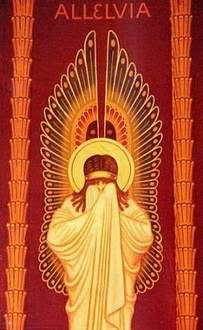
We desist from saying Alleluia, the song chanted by angels, because we have been excluded from the company of the angels on account of Adam’s sin. In the Babylon of our earthly life we sit by the streams, weeping as we remember Sion. For as the children of Israel in an alien land hung their harps upon the willows, so we too must forget the Alleluia song in the season of sadness, of penance, and bitterness of heart. (Bishop William Duranti, 1296).This medieval understanding of Lent and its traditions can help us voice our faith in the heavenly world to come and strengthen our awareness of our role in this earthly world now.
Before the reform of the liturgical calendar by Vatican II, the three weeks before Ash Wednesday were an additional time of preparation for Easter. The third Sunday before Lent was called Septuagesima Sunday (Latin for “seventy”). This was probably not to number the days before Easter but to remind the church of the seventy years of exile spent by the Jews in Babylon. Psalm 137 recalls how they prayed their tongues would be silenced if they forgot Jerusalem in ruins. From this psalm came the practice of fasting from singing the “Alleluia” during the Gospel acclamation throughout Lent and replacing it with a different acclamation of praise for Christ.
During the Middle Ages, the practice of “burying the Alleluia” on the eve of Septuagesima Sunday became popular. This lay-led ritual included a solemn procession to the church cemetery with a plaque, scroll, banner or even a coffin inscribed with the word “Alleluia.” Those in mock funeral procession wept while some sang the hymn, Alleluia, dulce carmen (known today as the hymn, “Alleluia, Song of Gladness”). The “Alleluia” was then laid to rest with the hope of its resurrection on Easter Sunday.
This burial was also called depositio, a Latin legal term meaning “the giving on deposit.” (Gravestones in Catholic cemeteries may have the inscription Depositus, or simply D, which comes from depositio.) When the burial of the Alleluia or of the faithful departed is understood by this term, the Christian belief in resurrection is clear. As we bury our dead, or as we enter into the fasting of Lent, we do not silence our tongues because of despair or permanent loss. Rather, we do so with confidence that what has been deposited into the earth—our dead, our Alleluia—will rise again. Yet in this period of preparation, we remain keenly aware of the mystery of sin and of our exile from the place where “Alleluia” abounds. So until we return to the New Jerusalem, let us not forget the sin that continues to devastate our world and our mission to heal what has been broken.
No comments:
Post a Comment